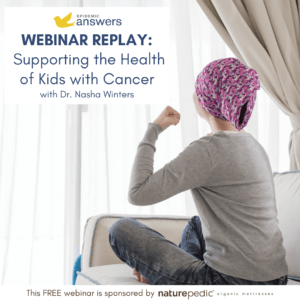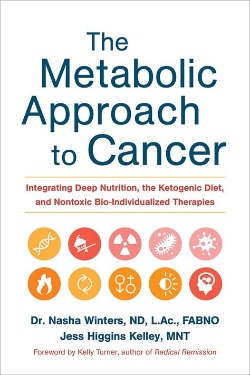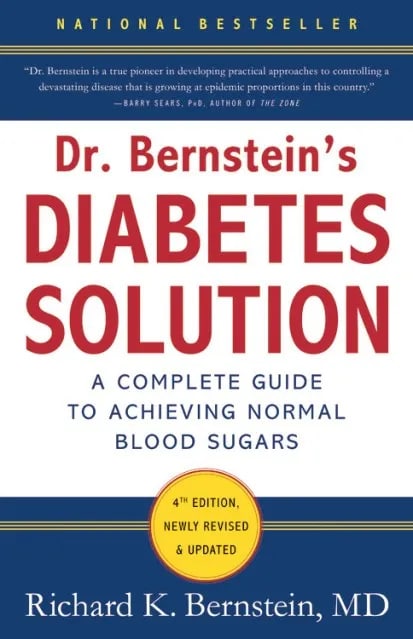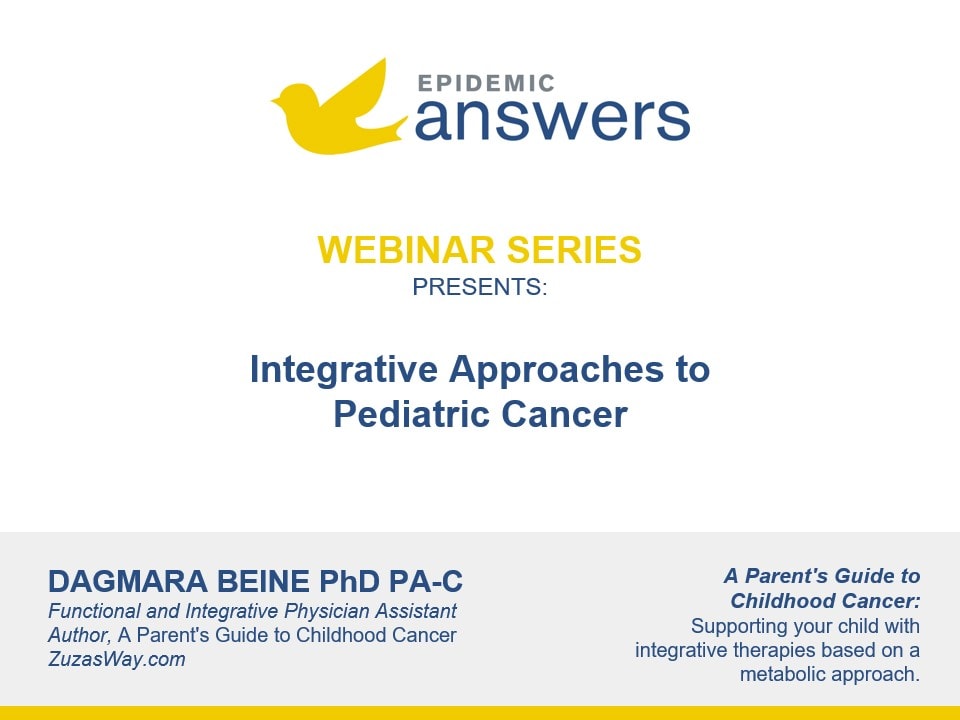We interviewed Nasha Winters ND LAc FABNO, the best-selling author of The Metabolic Approach to Cancer, about supporting the health of kids with cancer.
Children with cancer, and especially those going through cancer treatment, need additional health supports beyond what all of our kids need. There are special cellular energy and nutritional needs that bodies require to overcome cancer. When coupled with the stress and toxicity of chemotherapeutic treatments, a child needs even more health support.
 In this webinar, Dr. Nasha discussed a wide range of approaches that can support a child through cancer treatment such as:
In this webinar, Dr. Nasha discussed a wide range of approaches that can support a child through cancer treatment such as:
- Genetic, epigenetic, and nutrigenomic modifications
- Blood sugar balance with a ketogenic diet
- Toxic burden management
- Repopulating and balancing the microbiome
- Immune system maximization
- Modulating inflammation and oxidative stress
- Enhancing blood circulation while inhibiting angiogenesis and metastasis
- Establishing hormone balance
- Recalibrating stress levels and biorhythms
- Enhancing mental and emotional well-being
About Nasha Winters ND LAc FABNO
 Dr. Nasha Winters is a global healthcare authority in integrative cancer care and research consulting with physicians around the world. She is the best-selling author of The Metabolic Approach to Cancer: Integrating Deep Nutrition, the Ketogenic Diet, and Nontoxic Bio-Individualized Therapies. She has educated hundreds of professionals in the clinical use of mistletoe and has created robust educational programs for both healthcare institutions and the public on incorporating vetted integrative therapies in cancer care to enhance outcomes.
Dr. Nasha Winters is a global healthcare authority in integrative cancer care and research consulting with physicians around the world. She is the best-selling author of The Metabolic Approach to Cancer: Integrating Deep Nutrition, the Ketogenic Diet, and Nontoxic Bio-Individualized Therapies. She has educated hundreds of professionals in the clinical use of mistletoe and has created robust educational programs for both healthcare institutions and the public on incorporating vetted integrative therapies in cancer care to enhance outcomes.
Dr. Winters is currently focused on opening a comprehensive metabolic oncology hospital and research institute in the U.S. where the best that standard of care has to offer and the most advanced integrative therapies will be offered. This facility will be in a residential setting on a gorgeous campus against a backdrop of regenerative farming, EMF mitigation and retreat. You can find out more about her at her website www.drnasha.com
Disclaimer
This webinar is not a substitute for medical advice, treatment, diagnosis, or consultation with a medical professional. It is intended for general informational purposes only and should not be relied on to make determinations related to treatment of a medical condition. Epidemic Answers has not verified and does not guaranty the accuracy of the information provided in this webinar.
Still Looking for Answers?
Visit the Epidemic Answers Practitioner Directory to find a practitioner near you.
Join us inside our online membership community for parents, Healing Together, where you’ll find even more healing resources, expert guidance, and a community to support you every step of your child’s healing journey.
Sources & References
Accurso, A., et al. Dietary carbohydrate restriction in type 2 diabetes mellitus and metabolic syndrome: time for a critical appraisal. Nutr Metab (Lond). 2008 Apr 8:5:9.
Aggarwal, B.B., et al. Molecular targets of dietary agents for prevention and therapy of cancer. Biochem Pharmacol. 2006 May 14;71(10):1397-421.
Allen, B.G., et al. Ketogenic diets as an adjuvant cancer therapy: History and potential mechanism. Redox Biol. 2014:2:963-70.
Anand, P., et al. Cancer is a preventable disease that requires major lifestyle changes. Pharm Res. 2008 Sep;25(9):2097-116.
Bahr, L.S., et al. Ketogenic diet and fasting diet as Nutritional Approaches in Multiple Sclerosis (NAMS): protocol of a randomized controlled study. Trials. 2020 Jan 2;21(1):3.
Coller, H.A. Is cancer a metabolic disease? Am J Pathol. 2014 Jan;184(1):4-17.
Duan, W., et al. Hyperglycemia, a neglected factor during cancer progression. Biomed Res Int. 2014:2014:461917.
Giovannucci, E., et al. Diabetes and cancer: a consensus report. Diabetes Care. 2010 Jul;33(7):1674-85.
Labbé, D.P., et al. Role of diet in prostate cancer: the epigenetic link. Oncogene. 2015 Sep 3;34(36):4683-91.
Liu, H., et al. Refined fructose and cancer. Expert Opin Ther Targets. 2011 Sep;15(9):1049-59.
Lombardi, C., et al. Residential proximity to pesticide application as a risk factor for childhood central nervous system tumors. Environ Res. 2021 Jun;197:111078.
Lorenzi, M., et al. High glucose induces DNA damage in cultured human endothelial cells. J Clin Invest. 1986 Jan;77(1):322-5.
Onodera, Y., et al. Increased sugar uptake promotes oncogenesis via EPAC/RAP1 and O-GlcNAc pathways. J Clin Invest. 2014 Jan;124(1):367-84.
Seyfried, T.N. Cancer as a metabolic disease. Nutr Metab (Lond). 2010 Jan 27:7:7.
Seyfried, T.N. Cancer as a metabolic disease: implications for novel therapeutics. Carcinogenesis. 2014 Mar;35(3):515-27.
Seyfried, T.N., et al. Consideration of Ketogenic Metabolic Therapy as a Complementary or Alternative Approach for Managing Breast Cancer. Front Nutr. 2020 Mar 11:7:21.
Seyfried, T.N., et al. Is the restricted ketogenic diet a viable alternative to the standard of care for managing malignant brain cancer? Epilepsy Res. 2012 Jul;100(3):310-26.
Seyfried, T.N., et al. Metabolic management of brain cancer. Biochim Biophys Acta. 2011 Jun;1807(6):577-94.
Takano, T., et al. Glutamate release promotes growth of malignant gliomas. Nat Med. 2001 Sep;7(9):1010-5.
Tinkum, K.L., et al. Fasting protects mice from lethal DNA damage by promoting small intestinal epithelial stem cell survival. Proc Natl Acad Sci U S A. 2015 Dec 22;112(51):E7148-54.
Resources
Books
Bernstein, Richard K. Dr. Bernstein’s Diabetes Solution: The Complete Guide to Achieving Normal Blood Sugars. Little, Brown Spark, 2011.
Seyfriend, Thomas. Cancer as a Metabolic Disease: On the Origin, Management, and Prevention of Cancer. Wiley, 2012.
Winters, Nasha. The Metabolic Approach to Cancer: Integrating Deep Nutrition, the Ketogenic Diet, and Nontoxic Bio-Individualized Therapies. Chelsea Green Publishing, 2017.
Websites
Dr. Bernstein’s Diabetes Solution



